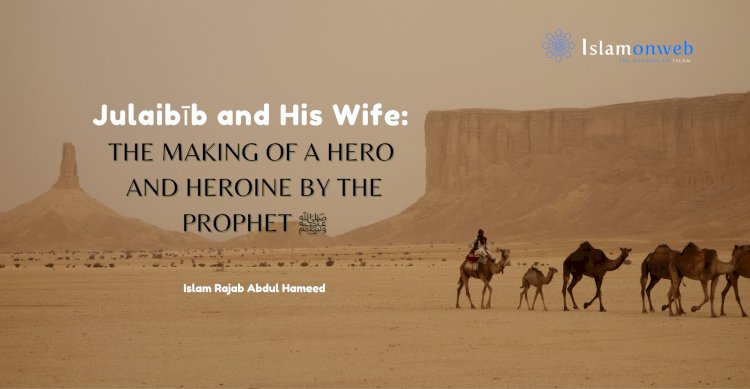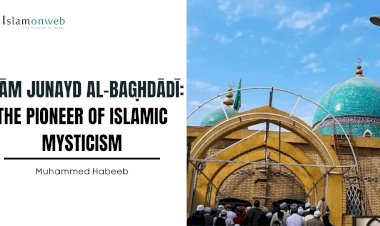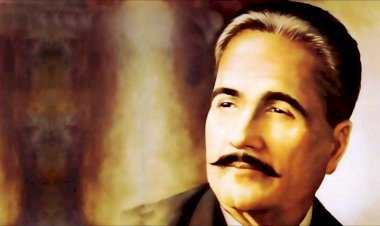Julaibīb and His Wife: The Making of a Hero and Heroine by the Prophet ﷺ
Julaibīb (رضي الله عنه) was a noble companion of the Prophet Muḥammad ﷺ, though not widely known among many, largely due to his humble means and simple status. Despite his poverty, Julaibīb was immensely rich in īmān (faith). He lived through the prime of his youth—a period of energy, vitality, and strength. This is a time in one’s life that, if utilised wisely, can have a profound and lasting impact on both the individual and society. Julaibīb was an example of how the proper use of youth can lead to greatness. His name was recorded in history, not with ink, but with letters of light.
He (رضي الله عنه) was known for his pleasant character and sense of humour. Though he remained unmarried, the Prophet ﷺ loved him deeply and showed great compassion towards him.
Let us explore the inspiring story of this remarkable ṣaḥābī (companion) (رضي الله عنه).
A Turning Point in Julaibīb’s Life
One day, the Prophet ﷺ playfully asked him, “Yā Julaibīb, will you not get married?”
Julaibīb responded with astonishment, “Yā Rasūl Allāh, who would marry me?” His response reflected his feelings of unworthiness, as he had neither a known family background, nor wealth, nor physical beauty.
The Prophet ﷺ replied, “I will find you a wife, O Julaibīb.”
Still hesitant, Julaibīb turned to the Prophet ﷺ and said, “So you will find me undesirable, yā Rasūl Allāh?”
The Prophet ﷺ reassured him, saying, “Yet in the sight of Allah, you are not undesirable.”[i]
This gentle interaction between the Prophet ﷺ and Julaibīb highlights the profound compassion of the Prophet ﷺ. By lifting Julaibīb’s spirits and addressing his inner insecurities, the Prophet ﷺ nurtured his self-worth and paved the way for a transformation in his life.
The Prophet ﷺ not only uplifted Julaibīb emotionally but also took it upon himself to secure a marriage for him. At one point, Abū Barzah al-Aslamī (نضلة بن عبيد) [ii](رضي الله عنه), known for his care for widows, the poor, and the needy, expressed concerns about Julaibīb’s conduct around women, as he would sometimes pass by and engage with them in light conversation. Concerned, Abū Barzah told his wife, “Let not Julaibīb enter upon you, for if he does, I shall surely act!”[iii]
When this reached the Prophet ﷺ, he did not dismiss Julaibīb but rather, with his wise nurturing, saw this as an opportunity to refine Julaibīb’s character and help him rise above societal judgments.
This turning point in Julaibīb’s life reveals how the Prophet ﷺ not only addressed social dynamics but also provided a framework for personal growth and dignity, even for those considered insignificant by societal standards.
Our youth today are in great need of mentors who can guide them, shape their character, and lead them towards success and excellence. The story of Julaibīb (رضي الله عنه) is a testament to the transformative power of wise and compassionate leadership. The Prophet Muḥammad ﷺ took it upon himself to nurture and refine Julaibīb, personally guiding him through life and seeking opportunities that would secure his well-being and future.
The Prophet ﷺ was patient, waiting for the right moment to arrange Julaibīb’s marriage. That opportunity finally arose when an Anṣārī man approached the Prophet ﷺ, offering his daughter in marriage. It was customary among the Anṣār for families not to arrange the marriage of their daughters until they first ensured whether the Prophet ﷺ himself desired to propose.
The Prophet ﷺ said to the Anṣārī man, “Marry me your daughter.”
The man, overjoyed, replied, “With honour and respect, O Messenger of Allah, she is yours.”
However, the Prophet ﷺ clarified, “I do not want her for myself.”
The man then asked, “For whom, O Messenger of Allah?”
The Prophet ﷺ responded, “For Julaibīb.”
The Family’s Initial Hesitation
Upon hearing the name Julaibīb, the father hesitated. His initial joy faded as he grappled with the idea of marrying his daughter to someone he deemed unfit due to Julaibīb’s lack of wealth, status, and family ties. In the father’s mind, Julaibīb seemed incapable of bearing the responsibilities of family life. What he failed to realise was that the Prophet ﷺ had already mentored and prepared Julaibīb, equipping him not only to care for a family but also to carry the responsibilities of an entire ummah.
The father then told the Prophet ﷺ, “Let me consult her mother.”
He went to his wife and informed her, “The Messenger of Allah ﷺ is proposing for our daughter.”
Overjoyed, the mother replied, “Yes! What an honour and a blessing.”
But when he clarified, “He is not proposing for himself, but for Julaibīb,” her reaction changed.
In disbelief, she exclaimed, “Julaibīb? Julaibīb? Julaibīb?” — repeating his name in shock.
She then objected firmly, “No, by Allah! We will not marry her to him. Did the Messenger of Allah ﷺ find no one else but Julaibīb? We have refused proposals from men far better than him, and now he asks for Julaibīb?”
A Test of Faith Over Social Status
The mother’s rejection of Julaibīb (رضي الله عنه) was strong and emotional, and the father, feeling caught between respect for the Prophet ﷺ and his wife’s disapproval, stood up to inform the Prophet ﷺ of their refusal. However, before he could leave, his daughter, who had been listening silently, showed remarkable wisdom and insight — a clarity that both her parents had momentarily missed.
The daughter, who had been listening quietly from behind a curtain, heard her mother’s strong rejection. Despite the negative remarks, she recognised the significance of the Prophet’s ﷺ choice. The initial reaction of her parents reflected societal norms — valuing wealth, lineage, and appearance — but the young woman saw beyond these superficial standards.
She asked her parents, “Who is it that has proposed for me? Is it Julaibīb himself, or is it the Messenger of Allah ﷺ?”
When her mother answered, “It is the Messenger of Allah ﷺ who is proposing on his behalf,” the daughter responded with profound understanding, “Do you reject the decision of the Messenger of Allah ﷺ? Send me to him, for he will never let me be lost. If the Prophet ﷺ has chosen him, then marry me to him.”
This response was a reflection of the daughter’s deep faith and maturity. She recognised a truth that her parents had overlooked: while Julaibīb himself may have been viewed as socially unsuitable, the proposal was not coming directly from him — it was initiated by the Prophet ﷺ. And any matter chosen by the Prophet ﷺ carried divine wisdom and benefit.
She did not let superficial standards cloud her judgement — she did not focus on Julaibīb’s appearance, poverty, or lack of lineage. Instead, she saw beyond these worldly measures and focused on the most critical aspect: Who was making the proposal? It was the Prophet Muḥammad ﷺ — the wisest, the most compassionate, and the most honourable of creation.
Her thinking was clear: If the Prophet ﷺ deems Julaibīb worthy, then who am I to question it? She also understood that the Prophet ﷺ had personally nurtured Julaibīb, guiding him, shaping his character, and preparing him for a righteous life. Julaibīb was not the man people thought he was — he was someone the Prophet ﷺ had refined with his own hands and heart.
Her acceptance of Julaibīb, not based on societal norms but on trust in the Prophet ﷺ, became a shining example of how faith can overcome prejudice and how true wisdom lies in following the divine path, even when it challenges cultural expectations.
The honour she gained was twofold — not only was she married to a man chosen by the Prophet ﷺ, but she also became a symbol of faith, trust, and insight, remembered in history for her wise heart and courageous decision.
A New Chapter: The Marriage of Julaibīb (رضي الله عنه)
The daughter’s wisdom and deep faith touched the hearts of her parents. Realising the truth in her words, they said to her, “You have spoken the truth.” With their hesitation replaced by acceptance, her father hastened to the Prophet Muḥammad ﷺ to inform him of their decision.
The Prophet ﷺ, pleased with their acceptance, said, “Then proceed with her marriage.” Thus, Julaibīb (رضي الله عنه) was married to the noble daughter of the Anṣār, with the full blessing of both her parents.
Their consent, following the wise input of their daughter, reflected the Islamic principle of mutual consultation (shūrā) and respect for the opinion of the woman in marriage decisions. They entrusted the Prophet ﷺ to conduct the marriage, and with his noble hands, the union was completed.
At the time of the marriage, the Prophet ﷺ raised his hands in duʿāʾ, invoking a special blessing for the bride:
“Allāhumma ṣubba ʿalayhā al-khayra ṣabbā ṣabbā, wa lā tajʿal ʿayshahā kaddā kaddā”
(“O Allah, pour upon her goodness in abundance, in overflowing measure, and do not make her life one of hardship.”)
This supplication was not just a prayer for material prosperity but for spiritual and emotional ease — a life filled with barakah (blessing), contentment, and tranquillity.
Under the shade of this divine blessing, Julaibīb (رضي الله عنه) and his wife began their new life together. Their home, though simple in appearance, was founded on the strongest of pillars — wisdom, īmān (faith), taqwā (God-consciousness), and mutual respect. It was a house that the Prophet ﷺ himself had nurtured into existence, ensuring that its foundations were built on the essence of Islamic values.
Together, they supported each other, guiding one another on the path of righteousness and success, not only in this world but also in the hereafter. Their marriage became a living example of what happens when divine wisdom guides life’s decisions — it leads to peace, growth, and spiritual fulfilment.
A Rare Heroism: Julaibīb’s Ultimate Sacrifice
Only a few days had passed since the marriage of Julaibīb (رضي الله عنه) when the call for jihād echoed through Madinah: “Yā Khayl Allāh irkabī” (“O cavalry of Allah, mount up!”). The Prophet Muḥammad ﷺ was preparing for a military expedition, and the companions responded eagerly. Among them was Julaibīb (رضي الله عنه), who, despite being in the early days of his marriage, did not hesitate to leave his home and join the ranks, seeking the reward of Allah[iv].
Julaibīb chose the path of sacrifice over personal comfort. Though he had just begun his married life, his heart longed for the eternal rewards of the hereafter. He joined the Prophet ﷺ and the companions on the journey, enduring the hardships of travel and the challenges of battle. Allah granted the Muslims victory that day, but not without its sacrifices.
As the dust of battle settled, the companions began tending to the wounded and counting their martyrs. The Prophet ﷺ, filled with concern for his companions, asked, “Do you miss anyone?”
They replied, “We miss so-and-so, and so-and-so.”
The Prophet ﷺ allowed them to search for the missing but soon asked again, “Do you miss anyone?”
They replied, “No, O Messenger of Allah.”
But the Prophet ﷺ, with the love he bore for Julaibīb, said, “But I miss Julaibīb. Search for him among the slain.”
While the companions had overlooked Julaibīb in their count, the Prophet ﷺ had not. His heart, deeply connected to Julaibīb, could not rest without knowing his fate. The companions spread out, searching through the battlefield, until they found Julaibīb’s body lying near seven enemies whom he had slain before falling as a martyr.
They returned to the Prophet ﷺ and said, “O Messenger of Allah, here he is — beside seven whom he killed before they martyred him.”
The Prophet ﷺ approached the body of Julaibīb (رضي الله عنه), gazing at him with immense love and pride. He stood over him and declared:
“Qatala sabʿatan wa qatalūh — hādhā minnī wa-anā minhu, hādhā minnī wa-anā minhu, hādhā minnī wa-anā minhu”
(“He killed seven, and they killed him. He is of me, and I am of him. He is of me, and I am of him. He is of me, and I am of him.”)
This weighty statement was an unparalleled honour — the Prophet ﷺ affirming that Julaibīb was not just a follower, but someone who had become an extension of the Prophet’s own heart and mission. The love and care that the Prophet ﷺ had poured into nurturing Julaibīb bore its fruit on that battlefield.
The Prophet ﷺ personally lifted Julaibīb’s body, placing him on his forearms. There was no bier or resting bed — only the blessed arms of the Prophet ﷺ cradled the martyr. He dug Julaibīb’s grave with his own hands and placed him inside.
As per Islamic rulings, martyrs are not to be washed or prayed over before burial, for their blood is a testimony of their sacrifice. Julaibīb was laid to rest just as he had fallen — a warrior, a believer, and a hero.
Divine Compensation: Allah’s Blessing Upon Julaibīb’s (رضي الله عنه) Widow
The Prophet Muḥammad ﷺ and his companions returned to Madinah victorious, their hearts filled with gratitude for Allah’s help and joy for the noble martyrs who had been honoured with shahādah (martyrdom) in His cause. Among the names of the fallen was Julaibīb (رضي الله عنه), whose story had now become a legacy of faith, courage, and sacrifice.
When the news of Julaibīb’s martyrdom reached his home, his wife received it not with cries of despair but with duʿmūʿ al-farḥah (tears of joy). She understood the immense honour Allah had bestowed upon her husband — to die as a shahīd and be granted a place in Jannah.
Her earlier conviction echoed in this moment: “Ataruddūna ʿalā Rasūlillāh ﷺ amrah? Idfaʿūnī fa-innahu lam yuḍayyiʿnī” (“Do you reject the command of the Messenger of Allah ﷺ? Send me forth, for he will not let me be lost”).
Indeed, her faith had been rewarded. Her trust in the Prophet ﷺ and her complete reliance on Allah’s decree did not go unnoticed by the One who sees all. Allah compensated her in this world before the next, as a manifestation of His divine generosity.
The duʿāʾ the Prophet ﷺ had made for her on the day of her marriage
— “Allāhumma ṣubba ʿalayhā al-khayra ṣabbā ṣabbā, wa lā tajʿal ʿayshahā kaddā kaddā” (“O Allah, pour goodness upon her in overflowing measure, and do not make her life one of hardship”) — came to life in its fullest form.
Allah opened for her the gates of abundant provision (rizq), honouring her with wealth and prosperity. Her life became a testament to the blessings that flow from submission to Allah’s will and the power of the Prophet’s ﷺ supplication.
Anas ibn Mālik (رضي الله عنه) said about her, “I never saw a widow in Madinah more generous than her.”
Unays ibn al-Ḍaḥḥāk (رضي الله عنه) similarly remarked, “I saw her, and she was the most prosperous of all the widows in Madinah.”
Thābit al-Bunānī (رضي الله عنه) stated, “Among the Anṣār, there was no widow wealthier than her.”
Through Allah’s bounty, she became a model of generosity, her home filled with barakah, and her name remembered for both her piety and charitable spirit.
It is narrated that Julaibīb (رضي الله عنه) was originally from Banū Thaʿlabah and was a ḥalīf (ally) among the Anṣār. His wife, whom the Prophet ﷺ had chosen for him, was from Banū al-Ḥārith ibn al-Khazraj (رضي الله عنهم)[v].
Julaibīb’s (رضي الله عنه) story stands as a beacon of selflessness, courage, and faith. From a man society had overlooked, the Prophet ﷺ shaped him into a symbol of heroism. His journey from obscurity to eternal honour teaches us that true greatness lies not in worldly status but in sincere devotion and readiness to sacrifice for Allah’s cause. The widow’s journey teaches that those who place their reliance on Allah, prioritising His pleasure over societal norms, will never be left in despair.
(The article is translated from an Arabic article published on Alukha.net by the author)
Reference
Musnad Abī Yaʿlā al-Mawṣilī, Musnad Anas ibn Mālik, Narration by Thābit al-Bunānī from Anas ibn Mālik, Hadith No. 3343, Volume 6, p. 89.
Usud al-Ghābah fī Maʿrifat al-Ṣaḥābah by Ibn al-Athīr, Under the letter Nūn, section Nūn and Ḍād, Entry No. 5226 — Naḍlah ibn ʿUbayd al-Aslamī.
Musnad al-Imām Aḥmad, Musnad al-Baṣriyyīn, Hadith of Abū Barzah al-Aslamī, Hadith No. 19784.
Sharḥ al-Nawawī ʿalā Ṣaḥīḥ Muslim by Imām al-Nawawī, Commentary on the hadith about Julaibīb (رضي الله عنه), Under “Bāb Min Faḍāʾil Julaibīb (رضي الله عنه)”, Volume 16, p. 26, published by Dār Iḥyāʾ al-Turāth al-ʿArabī.
Ṣifat al-Ṣafwah by Ibn al-Jawzī, Mentioned under the third generation of Muhājirūn and Anṣār who witnessed the Battle of the Trench (al-Khandaq) and events thereafter, Volume 1, p. 283.
Ṭabaqāt Ibn Saʿd, Third generation of Muhājirūn and Anṣār who participated in the Battle of the Trench, Volume 5, p. 393.
Disclaimer
The views expressed in this article are the author’s own and do not necessarily mirror Islamonweb’s editorial stance.
























Leave A Comment